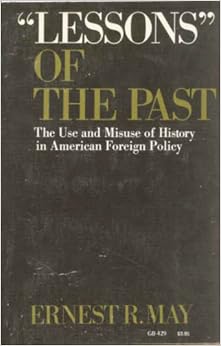I recently read "Lessons" of the Past: The Use and Misuse of History in American Foreign Policy by Ernest R. May. He focuses on the use of historical analogies in foreign policy decision making. I posted several times while reading the book. (Here is my most recent post, which has links to the earlier ones.) I want to expand my thoughts on thinking about foreign policy using (historical) analogies.
Kinds of Foreign Policy Thinking
There are some 200 countries in the world, many regional bodies, and more than a thousand international bodies. Now the United States with more than 300 million people and millions of people in government can do thousands of things at one time. The White House, however, has to triage.
Some issues, such as Latin American Policy or the negotiations of the Atlantic and Pacific Trade Agreements are long term efforts. You might think of them as analogous to a person managing an investment portfolio. Every once and a while a change will be made, but generally investments should be made for the long term; monitoring can be occasional and to some degree delegated to others.
On the other hand there are things that demand immediate, intensive attention:
- Crises such as those now occurring in Ukraine and Syria;
- Important, long-standing situations where we have initiated substantive efforts, such as the efforts to promote peace talks between Israel and Palestine, or the negotiations with Iran to prevent nuclear armament;
- Situations with significant changes, as happened with the change of leadership in North Korea, a country which might be a significant threat to our Asian allies.
The decision making in these cases might be more akin to betting on a horse race -- you make your bet and see how it turns out relatively quickly.
A Thought About the Race Track Analogy
A child taken to the horse races might think that since a black horse won the previous race, a black horse would be likely to win the next; if a jockey in green silks won a race, a child might expect the jockey in green would win the next. A child might take the color of the horse or the silks as important aspects of a race on which to chose appropriate analogies.
The experienced punter would look at variables such as performance (time, final position, problems in the race) in similar races in the past, weight carried, and the skill of the jockey; he might look at the condition of the track for the coming race, and look for analogous races under similar conditions. My father, who grew up around race tracks and had been a jockey, could look at the horses being saddled and moving onto the track, and make some estimate of the animals' condition.
The serious and successful punter will realize that he/she will not win every bet. Rather he/she will look for bets where the odds at the track are better than he/she thinks they ought to be, avoiding betting where the odds are worse than his/her estimates. A punter that consistently does a much better job estimating the odds than the majority of betters will often come out ahead over time.
What Does This Mean for the Use of Historical Analogy in Dealing with Foreign Policy Crises?
Foreign Policy officials need to choose the right aspects of the current crisis and past crises on which to judge whether something is or is not a useful analogy. Must analogies be drawn from the same cultural context or similar epochs, or might the Arab Spring be usefully compared to the contagion of revolutionary movements in western Europe in 1848? Does the party of the administration and the current domestic political climate matter; Is President George Bush' Chicken Kiev speech a useful analogy for the Obama administration to study today?
The experienced punter can find a wealth of information in the racing form. It is not clear that there is comparable accurate information available on the relevant aspects of either the current situation or the various possible historical analogies. If you don't know what the situations really were, what alternatives were considered, or how the decisions really worked out, then the analogous situation is not very useful.
Betters know that they deal with probabilities. They want information on a number of comparable races for each horse so that they can make an estimate of the reliability of the animal as well as of its likely competitive performance against others. So too, I think the foreign policy decision maker would be well advised to consider a number of historical analogs to the current problem, to get some idea of the range of likely outcomes.
Biases
We know that there is a real problem in foreign policy decision making when people at the table are too much alike, one to another, and not enough diversity is included in the advisory groups. So too, we know of the problem where advisers fear to tell a decision maker what he/she doesn't want to hear.
May focuses on a few biases. One is the tendency to rely on a single analogy, usually relating to an important foreign policy event that occurred when the policy maker was already in senior government office.
One might be concerned with the selective use of analogies, or selective facts from the analogy as part of a rhetorical argument to convince, rather than a scholarly analysis to aid decision making.
Perhaps of equal importance there are a number of bodies of knowledge that bear on decision making in political, bureaucratic, group and individual decision making that might help to make foreign policy decision making better.

No comments:
Post a Comment